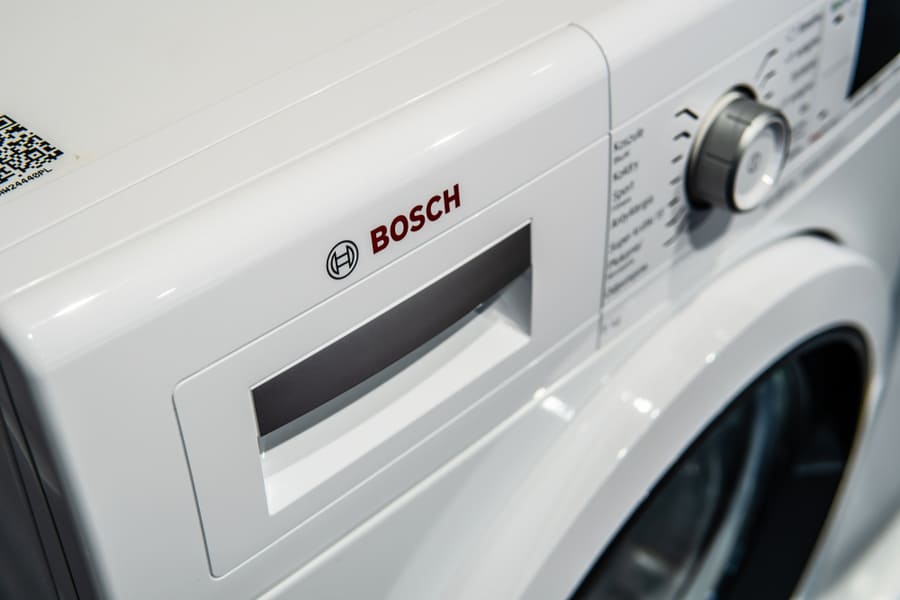
So you just finished a load of laundry only to open your Bosch washer to be greeted by a foul odor. It’s not exactly what you would expect from an appliance that’s expected to clean what it contains.
While the foul scent might not cling to your freshly washed clothes, it could make you want to reconsider using your washing machine altogether.
Now, before you think about replacing your Bosch washing machine, here are some possible explanations for its smelly condition and what you can do to fix it.
- Detergent suds can thrive in a Bosch washer’s nooks and crannies.
- Accumulated filth can create the perfect breeding ground for mold, mildew, microbes, and bacteria.
- Routine cleaning can help eliminate odors and keep your Bosch washer smelling fresh.
When faced with a smelly Bosch washer, the immediate problem that might come to mind is accumulated dirt — and you would be right.
Most Bosch washer models have nooks and crannies that can house all sorts of contamination. Thus cleaning these areas should help reduce any foul odors.
Why Does Your Bosch Washer Smell Bad?

A combination of dirt and accumulated soap residue — it’s as simple as that. Your Bosch washer has a number of areas that could provide a place for detergent suds, lint, and other contaminants to accumulate.
The most common place where these contaminants stay is the door’s gasket.
The accumulation of this gunk and grime can encourage the development of mold and mildew. It also allows bacteria and microbes to thrive, thus producing a foul odor whenever you open your Bosch washer’s door.
How To Clean Your Bosch Washer

Your Bosch washer model might have a self-cleaning feature that should work fine to get rid of dirt and contamination in the tub. However, there are areas in your washer that this feature might not be able to address, including the door gasket.
Here’s what you can do to clean it:
- Pull back the rubber gasket. Behind the rubber material, you might find an accumulation of hair, lint, dirt, and slimy, thick soap suds. In some cases, you might also find black spots indicating mold growth.
- Use a clean cloth to wipe away accumulated filth. Dampen your cloth with warm water and wipe away the built-up residue.
- Apply mold and mildew remover. Use the product as indicated in the instructions. In its place, you can use a solution of vinegar and water at a one-to-one ratio. Spray the solution and wipe away its residue with a clean cloth.
After cleaning the gasket, you can start washing the tub. Here’s how to do it:
- Put a half cup of baking soda in the tub. Open the detergent drawer and add two cups of vinegar.
- Turn on the washing machine and set it to a regular cycle. Choose hot water.
- If you haven’t cleaned your Bosch washer in a while, you can perform a second cleaning with just bleach.
- Once you’re done cleaning, run a rinse cycle twice to get rid of residual vinegar and baking soda.
- If the smell of vinegar remains, you can run another cycle using a commercial washing machine cleaner.
Conclusion
Sometimes, all your Bosch washer needs is a thorough cleaning. So if you’re met with a foul odor upon opening your washer door, it might be high time to clean it out.
Make sure to check all of its nooks and crannies to get rid of caked detergent suds.
Cleaning your Bosch washer regularly should also help keep foul odors from developing in the first place.
Frequently Asked Questions
How Often Should I Clean My Bosch Washer?
Check your user manual to find out how often you should clean your Bosch washer. Following the manufacturer’s instructions should help keep your warranty intact.
If the manual doesn’t make mention a schedule, you can incorporate a cleaning schedule into your routine at least once every two months.
What Can I Use To Clean My Bosch Washer?
A combination of baking soda, vinegar, lemon juice, or orange citrus oil should help keep your washer smelling fresh and clean. Make sure to check the user manual, though.
To keep your warranty intact, it’s best to check in with the manufacturer to find out what cleaning solutions they recommend.












